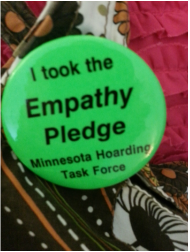
All too often people experience the shock factor of hoarding instead of meeting the person behind the stuff. Media feeds our voyeuristic tendencies and shows extreme cases of people living among various stages of decomposition and filth. At times this may be the case, but this is far from the whole story, and unfortunately this story perpetuates the shame that permeates a hoarded home and the family involved.
Hoarding is a mental health disorder. Let me say that again, hoarding is a MENTAL HEALTH disorder, it is not as simple as a choice to keep or not keep things. 2-5% of Minnesotans struggle daily with Hoarding, and even more struggle with the effects of hoarding, since they interact with a person who hoards on a regular basis.
Often hoarding behaviors are tied to grievous losses of loved ones and dreams. The truth is, this is not just about a lot of stuff, this is a person struggling to cope, and coping in the best way they know how.
People who struggle with hoarding need support, and empathy instead of the shame and judgement that they most often receive. This month is Hoarding Awareness month in Minnesota. Please take a moment to reduce the shame of hoarding by pledging to be compassionate to those struggling with the challenging circumstances they face every day. Join me, by taking the Empathy Pledge, and become part of the solution today.
Together we can make a difference!
http://thehoardingproject.org/home/minnesota-hoarding-task-forcep.s. I'm on the MN Hoarding Task Force, you can find more information about the MN hoarding task force, or about hoarding here:
 RSS Feed
RSS Feed
